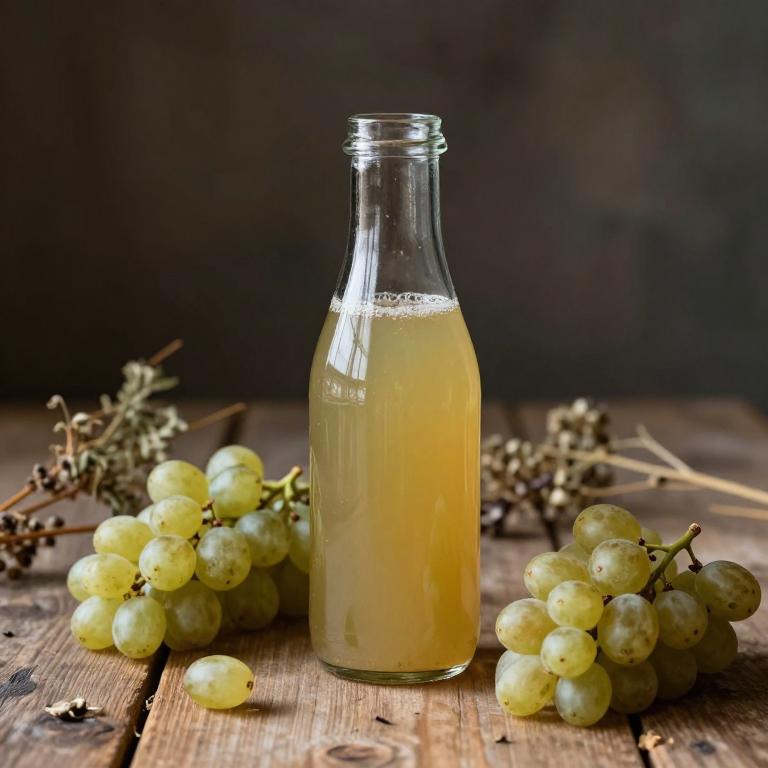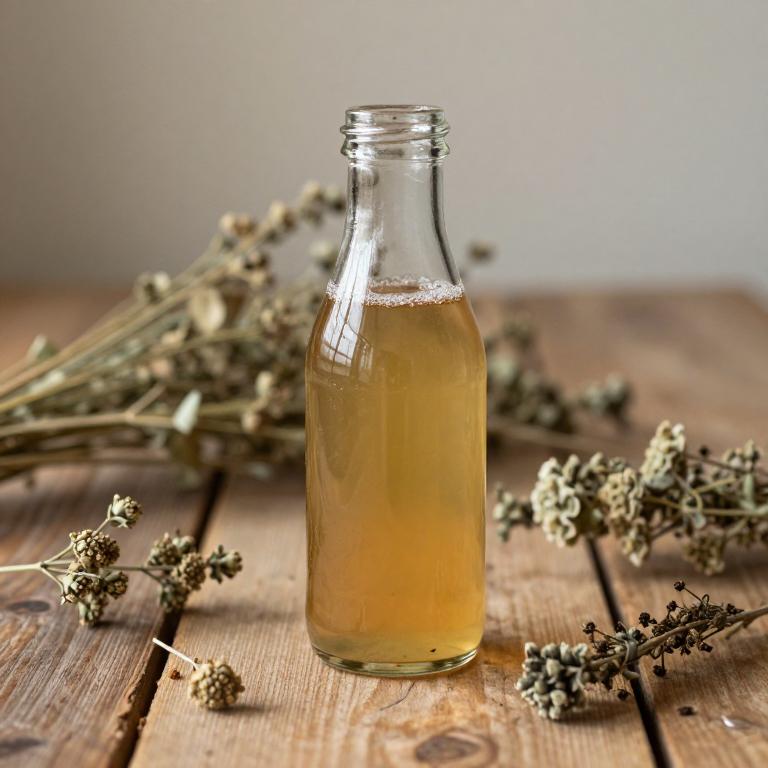10 Best Herbal Juices For Bursitis

Herbal juices can be a natural and supportive complement to conventional treatments for bursitis, as they often contain anti-inflammatory and antioxidant properties that may help reduce swelling and pain.
Herbs such as turmeric, ginger, and willow bark are commonly used in herbal juices due to their ability to inhibit inflammatory responses in the body. These juices can be made by blending fresh herbs with water or other juices, providing a refreshing and nutrient-rich option for those seeking alternative therapies. However, it is important to consult with a healthcare professional before incorporating herbal juices into a treatment plan, as some herbs may interact with medications or have side effects.
While herbal juices may offer relief, they should not replace medical advice or prescribed treatments for bursitis.
Table of Contents
- 1. Turmeric (Curcuma longa)
- 2. Ginger (Zingiber officinale)
- 3. Salvia (Salvia officinalis)
- 4. Stinging nettle (Urtica dioica)
- 5. Common grape (Vitis vinifera)
- 6. Yarrow (Achillea millefolium)
- 7. Field horsetail (Equisetum arvense)
- 8. Thistle (Silybum marianum)
- 9. Dog rose (Rosa canina)
- 10. St. john's wort (Hypericum perforatum)
1. Turmeric (Curcuma longa)

Curcuma longa, commonly known as turmeric, contains curcumin, a compound with potent anti-inflammatory and antioxidant properties that may help alleviate symptoms of bursitis.
When consumed as a herbal juice, turmeric can support joint health by reducing inflammation and oxidative stress around the affected bursae. To prepare turmeric juice, fresh turmeric root is typically grated and blended with water or a carrier liquid like coconut milk for better absorption. Some studies suggest that regular consumption of turmeric juice may complement conventional treatments for bursitis, though it should not replace medical advice.
It is important to consult a healthcare provider before using turmeric juice, especially if you are on medications or have underlying health conditions.
2. Ginger (Zingiber officinale)

Zingiber officinale, commonly known as ginger, has been traditionally used for its anti-inflammatory and pain-relieving properties, making it a potential natural remedy for bursitis.
Ginger contains bioactive compounds like gingerol and shogaol, which may help reduce inflammation and swelling around the affected bursae. Herbal juices made from fresh or dried ginger can be consumed daily to support joint health and alleviate discomfort associated with bursitis. However, while some studies suggest its benefits, more research is needed to confirm its efficacy as a standalone treatment.
It is advisable to consult a healthcare professional before using ginger juice as a complementary therapy for bursitis.
3. Salvia (Salvia officinalis)

Salvia officinalis, commonly known as sage, has been traditionally used for its anti-inflammatory and analgesic properties, making it a potential natural remedy for bursitis.
The herbal juices derived from sage leaves contain compounds such as rosmarinic acid and flavonoids, which may help reduce inflammation and pain associated with bursitis. Some studies suggest that these compounds can inhibit inflammatory pathways in the body, potentially offering relief to individuals suffering from joint-related conditions. While more research is needed to confirm its efficacy, many people use sage juice as a complementary therapy alongside conventional treatments.
It is important to consult with a healthcare provider before incorporating sage juice into a treatment plan for bursitis to ensure safety and appropriateness.
4. Stinging nettle (Urtica dioica)

Urtica dioica, commonly known as stinging nettle, has been traditionally used for its anti-inflammatory properties, making it a potential herbal remedy for bursitis.
When prepared as a juice, stinging nettle can help reduce inflammation and pain associated with bursitis by providing a rich source of antioxidants and minerals such as silica and magnesium. To make the juice, fresh or dried nettle leaves are typically blended with water or a mild citrus juice to enhance absorption and reduce the stinging effect. Some studies suggest that the compounds in nettle juice may support joint health and alleviate symptoms of inflammatory conditions like bursitis.
However, it is important to consult a healthcare professional before using nettle juice, especially if you are on medications or have existing health conditions.
5. Common grape (Vitis vinifera)

Vitis vinifera, commonly known as the grape vine, has been traditionally used in herbal medicine for its anti-inflammatory and antioxidant properties, which may offer potential benefits for individuals suffering from bursitis.
The juice extracted from Vitis vinifera grapes contains polyphenols, resveratrol, and other bioactive compounds that have been shown to reduce inflammation and oxidative stress in the body. These properties may help alleviate the pain and swelling associated with bursitis by supporting joint health and reducing tissue irritation. While more scientific research is needed to confirm its efficacy, some anecdotal evidence suggests that consuming Vitis vinifera herbal juices may complement conventional treatments for bursitis.
As with any herbal remedy, it is advisable to consult a healthcare professional before incorporating Vitis vinifera juice into a treatment regimen for bursitis.
6. Yarrow (Achillea millefolium)

Achillea millefolium, commonly known as yarrow, has been traditionally used for its anti-inflammatory and analgesic properties, making it a potential herbal remedy for bursitis.
The plant contains compounds such as flavonoids and essential oils that may help reduce inflammation and pain associated with bursitis. Some herbal preparations of yarrow include juices or tinctures that can be applied topically or consumed internally under the guidance of a healthcare professional. While there is limited clinical evidence supporting its use for bursitis, many individuals report relief from symptoms when using yarrow-based remedies.
It is important to consult with a qualified practitioner before using yarrow juice, as it may interact with medications or have side effects in certain individuals.
7. Field horsetail (Equisetum arvense)

Equisetum arvense, commonly known as field horsetail, is a herb traditionally used for its high concentration of silica and other bioactive compounds.
Herbal juices made from Equisetum arvense are believed to have anti-inflammatory properties that may help alleviate symptoms of bursitis by reducing swelling and pain. These juices are often prepared by soaking the fresh or dried plant in water or alcohol to extract its beneficial compounds. While some studies suggest potential benefits, more clinical research is needed to confirm their efficacy for bursitis.
As with any herbal remedy, it is important to consult a healthcare professional before use, especially if you are taking other medications or have underlying health conditions.
8. Thistle (Silybum marianum)

Silybum marianum, also known as milk thistle, is a herbal plant commonly used in the form of juice to support liver health, but it may also offer benefits for individuals suffering from bursitis.
The active compound in silybum marianum, silymarin, is known for its antioxidant and anti-inflammatory properties, which can help reduce inflammation and pain associated with bursitis. While there is limited direct research on its effectiveness for bursitis, its ability to reduce oxidative stress and promote tissue repair may indirectly support joint and bursa health. Some individuals use milk thistle juice as a complementary therapy alongside conventional treatments for bursitis, though it should not replace medical advice or prescribed medications.
As with any herbal supplement, it is important to consult with a healthcare provider before incorporating silybum marianum juice into a treatment plan for bursitis.
9. Dog rose (Rosa canina)

Rosa canina, commonly known as rosehip, is a natural remedy that has been used for centuries to support joint health and reduce inflammation.
Rosa canina herbal juices are rich in essential oils, vitamins, and antioxidants, which can help alleviate the pain and swelling associated with bursitis. These juices are believed to promote the regeneration of cartilage and improve joint mobility, making them a popular choice for individuals suffering from inflammatory conditions. The anti-inflammatory properties of rosehip may help reduce the inflammation in the bursae, which are the small fluid-filled sacs that cushion the joints.
While more research is needed, many people find relief from bursitis symptoms through regular consumption of rosa canina herbal juices as part of a holistic approach to joint care.
10. St. john's wort (Hypericum perforatum)

Hypericum perforatum, commonly known as St. John's Wort, is a herb that has been traditionally used for its anti-inflammatory and analgesic properties.
While it is more commonly associated with treating mild depression, some studies suggest it may have potential benefits for reducing inflammation in conditions like bursitis. The active compounds in St. John's Wort, such as hypericin and hyperforin, are believed to contribute to its anti-inflammatory effects by modulating neurotransmitter activity and reducing oxidative stress. However, it is important to note that the use of St. John's Wort for bursitis should be approached with caution, as it can interact with various medications, including antidepressants and blood thinners.
Always consult a healthcare professional before incorporating herbal juices like St. John's Wort into a treatment plan for bursitis.